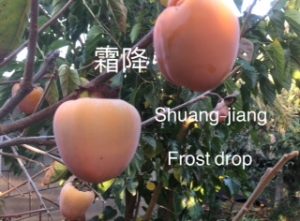
Shuang-jiang (noun) 霜降 (Chinese): Frost descent (18th solar term), literally in Chinese “shuang” 霜 = frost, “jiang” 降 = drop.
Example:
Shuang-jiang is the 18th solar term of 24 solar terms in the Chinese lunar calendar. Shuang-jiang begins when the Sun reaches the celestial longitude of 210° and ends when it reaches the longitude of 225°. Shuang-jiang often refers in particular to the day when the Sun is exactly at the celestial longitude of 210°. In the Gregorian calendar, Shuang-jiang usually begins around October 23 and ends around November 7. Shuang-jiang is also the last solar term in Autumn meaning that the winter is about to begin. During Shuang-jiang, the weather is chilling and you will see the first frost. At this time of the frosty season, health care is particularly important. There is a Chinese proverb; “It is better to take tonic food for your health during Shuang-jiang than taking it every day for a whole year.” Shuang-jiang shows the impact of this solar term on people. The persimmons are fully ripened and taste better after Shuang-jiang.
In Chinese old saying, there are three periods of the frosty Shuang-jiang; The first period 豺乃祭兽 is “Carnivore animals reserve food for the winter from the beginning of the frost”, the second period 草木黄落 is “vegetation turns yellow and deciduous leaves fall”, and the last period 蜇虫咸俯 “when insects are preparing to hibernate and begin to hide in their cave for the winter.”
Since ancient times, Shuang-jiang has been a solar term for agricultural purposes in the lunar calendar. Shuang-jiang is still remembered and celebrated as a Chinese traditional festival.
